Dealing with a lymphoma diagnosis is tough. You're not just fighting a disease—you're facing all sorts of emotions, from fear to confusion. It can really shake up your sense of stability. But amidst all this, spirituality can be a beacon of comfort and meaning.
So, what is it about spirituality that speaks to people going through rough times like lymphoma? Well, it's different for everyone. Some turn to prayer or meditation, while others find peace in nature or through creative outlets. It's not about following a rule book, but more about finding what feels right for you.
Spirituality can help anchor you when life feels unpredictable. It's like having a toolkit that you can rely on to help carry you through the storm. Integrating practices that resonate with you into your daily routine can make a significant difference.
- Understanding Lymphoma
- The Role of Spirituality
- Finding Comfort in Practices
- Building a Supportive Community
- Personal Stories of Hope
- Integrating Spiritual Practices
Understanding Lymphoma
Lymphoma is a type of cancer that begins in the lymphatic system, which is a key player in the body's immune system. It's made up of various components, including lymph nodes, the spleen, and the thymus gland. The main job of the lymphatic system is to help the body fight infections and get rid of waste.
Types of Lymphoma
There are two primary types of lymphoma: Hodgkin's lymphoma and non-Hodgkin's lymphoma (NHL). The distinction between them lies in the specific lymphocytes affected. Hodgkin's is marked by the presence of Reed-Sternberg cells, detected under a microscope, whereas NHL includes several subtypes that act quite differently from one another.
Signs and Symptoms
If you're scratching your head wondering what the signs are, here's a quick rundown. Common symptoms include painless swelling of lymph nodes, especially in the neck, armpits, or groin. You might also experience fever, night sweats, unexplained weight loss, or persistent fatigue. Not exactly fun stuff, but noticing these early can make a big difference.
Diagnosis and Treatment
Getting diagnosed usually involves imaging tests like CT or PET scans, and sometimes a biopsy, where a small tissue sample is taken for testing. Once diagnosed, the treatment may include chemotherapy, radiation therapy, or targeted drug therapy, depending on the type and stage of the lymphoma.
Statistics to Consider
| Type | 5-Year Relative Survival Rate |
|---|---|
| Hodgkin's Lymphoma | 88% |
| Non-Hodgkin's Lymphoma | 73% |
These stats give you a snapshot of the general outcome expectations, but remember, everyone is different. It's always about personal factors, including overall health and specific disease characteristics.
Understanding these basics can be empowering. Knowing what you're up against equips you with the information needed to make informed decisions about your health and treatment options.
The Role of Spirituality
When you're dealing with lymphoma, sometimes the path gets a little blurry. That's where spirituality steps in. It's not about religion per se, but more about connecting to something bigger than ourselves. This connection can provide comfort, peace, and, most importantly, a sense of meaning.
Studies have shown that people who engage with their spiritual side tend to cope better with illness. It's like having an inner ally in the fight. A report from the National Cancer Institute highlights that spirituality can enhance emotional well-being and, in some cases, even physical health outcomes.
Different Paths, Same Comfort
Everyone's spiritual journey is unique. Some might find solace in age-old religious practices, while others might explore mindfulness or yoga. Whatever it is, the goal remains the same—to find peace.
- Prayer: For many, prayer serves as a direct conduit to acceptance and hope.
- Meditation: A great tool for staying present, easing anxiety, and grounding one’s thoughts.
- Community Involvement: Sometimes spirituality is found in shared experiences and support within a community.
Finding Your Spiritual Corner
You don't need an elaborate plan to tap into your spirituality. Even small steps can make a big difference. For instance, setting aside a few minutes each day for reflection can be refreshing. Over time, these moments add up, offering stability in the roller coaster ride that is lymphoma.
In the end, spirituality isn't a cure, but it's a hand to hold, a gentle whisper of support when you most need it. This connection can help transform the journey with lymphoma into one that's not just about surviving, but also about finding deeper meaning along the way.
Finding Comfort in Practices
When facing challenges like lymphoma, finding the right practices can offer real comfort. It's not about big changes but rather small, meaningful actions that add up. Let's look at some ways people find solace.
Mindfulness and Meditation
Meditation isn't just for monks on mountain tops. Anyone can give it a shot. It's about taking a few minutes to breathe, focus, and let your mind relax. Studies suggest that regular meditation can lower stress levels and improve emotional health. You don't need any fancy gear; all you need is a quiet space.
Prayer and Reflection
Many folks find peace through prayer and reflection. It's like having a conversation with something greater than ourselves. This practice can make you feel connected and grounded. Whether you're in a place of worship or sitting at home, it's accessible to anyone interested.
Nature Walks
Being outdoors can be incredibly healing. A simple walk in the park can do wonders for your mental state. Nature has this uncanny ability to calm the mind, and those feelings of comfort and clarity are crucial when handling the emotional ride of lymphoma.
Creative Expression
Art, music, writing — these aren't just hobbies. They can be powerful outlets for emotions. Creative expression enables you to process feelings and maybe even find joy in the process. Plus, there are tons of online communities and resources if you're looking to join others who share your interest.
Community Support Groups
Connecting with others on the same journey can be incredibly reassuring. Support groups, whether in-person or online, provide a space to share experiences, advice, and encouragement. When in doubt, lean on the wisdom and support of those who've been there.
These practices aren't one-size-fits-all. Try different things, see what sticks. The goal is to add comfort and meaning to your life in a way that feels authentic to you.
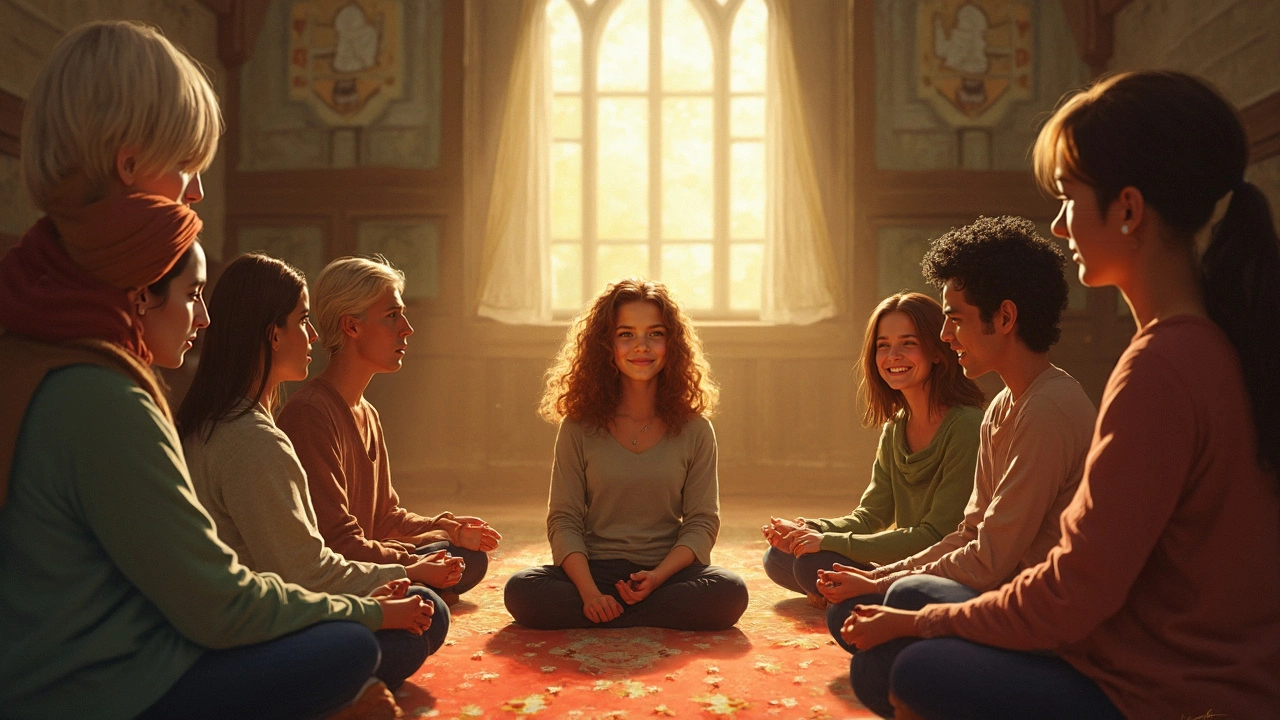
Building a Supportive Community
When you're facing lymphoma, having the right people around you can make all the difference. It's not just about having folks you can call at 2 a.m.—though that's helpful—but about being part of a community that gets what you're going through. This shared understanding can bring a lot of comfort.
One of the first steps is to identify who in your life can contribute to this supportive community. These could be family members, friends, or even fellow patients who understand the journey. You might also consider reaching out to local or online support groups specifically focused on lymphoma.
Finding the Right Support Groups
Support groups offer a space where you can vent your frustrations or share victories with people who get it. There are many online forums, such as those hosted by organizations like the Leukemia & Lymphoma Society, where you can connect with others 24/7. Some might even have specific groups focusing on spiritual coping methods, aligning with whatever background you're familiar with.
Building Connections Online
The digital realm is a treasure trove for creating these bonds. Platforms like Facebook or Reddit have groups dedicated to those navigating lymphoma. You can join discussions, find advice, or simply lurk, taking in the collective wisdom and experience of others.
Leveraging Technology
Virtual meet-ups via platforms like Zoom have become the new norm, especially when distance or health concerns make face-to-face meetings unrealistic. Having a community even when you're housebound helps ensure you never feel isolated.
The Role of Professional Support
Sometimes, professional help is essential. Psychologists or counselors who specialize in oncology can provide individualized support. They're trained to help manage the rollercoaster of emotions that comes with cancer diagnoses, offering techniques and coping strategies.
Creating a supportive community can lead to shared experiences that enrich your journey with lymphoma. By weaving together personal connections and professional resources, you empower yourself with a network that offers strength, understanding, and a shared sense of purpose.
Personal Stories of Hope
Hearing from others who have walked a similar path can be a powerful source of inspiration for those navigating lymphoma. Personal stories bring to light the resilience and determination that can flourish, even in the face of a challenging diagnosis.
Take Jane Turner, for example. Diagnosed with lymphoma at 45, she initially felt overwhelmed and afraid. However, Jane turned to her community for support and strength. She became a part of a local support group, which provided not only emotional relief but also practical advice. "The stories I heard there were a lifeline," Jane recalls. "They helped me see the light at the end of some very dark tunnels."
Another inspiring tale is that of Darren Cook, a 60-year-old who found his solace in gardening. For Darren, spirituality came through connecting with the earth, growing his faith along with his plants. During his chemotherapy sessions, Darren kept a journal of his thoughts and reflections, which he describes as "a garden within a garden." This practice allowed him to reflect and find a sense of peace.
"Hope is like the sun, which, as we journey toward it, casts the shadow of our burden behind us." – Samuel Smiles
It's stories like these that highlight how important it is to find your own path to comfort. Whether through faith, community, or nature, finding what genuinely resonates with you can profoundly impact your healing journey.
| Name | Source of Hope | Age at Diagnosis |
|---|---|---|
| Jane Turner | Support Group | 45 |
| Darren Cook | Gardening | 60 |
Remember, it's not just about surviving lymphoma; it's about finding ways to thrive even when the circumstances seem dire. These personal stories remind us that hope can be found in unexpected places—and it's often those small, everyday actions that make the biggest difference.
Integrating Spiritual Practices
When life gets challenging, especially with lymphoma on your plate, integrating spiritual practices into your daily life can offer comfort and a sense of control. But how do you even start?
Start with Meditation and Mindfulness
Meditation is a great place to begin. You don't need fancy gear or a specific place—just a quiet spot and a few minutes each day. Mindfulness meditation encourages you to focus on the present moment, which can help reduce anxiety and improve your overall mental health.
Here's a simple way to get started:
- Find a quiet spot where you can sit comfortably.
- Set a timer for as little as five minutes. Consistency is more important than duration.
- Focus on your breathing. When your mind wanders—and it will—gently bring your focus back to your breath.
Dive into Prayer and Reflection
For many, prayer is a source of strength. It doesn't have to be associated with a particular religion to be effective. Reflecting on your values, goals, or simply expressing gratitude can bring a positive shift in perspective.
Engage with Nature
Nature has this incredible ability to refresh and renew. Regular walks outside or simply sitting in a garden can help clear the mind and connect you to something larger than yourself. So, put on those walking shoes and spend time in your local park. It's more therapeutic than most people realize!
Journaling: An Outlet for Emotions
Writing can be profoundly therapeutic. Jotting down your thoughts and feelings about your lymphoma journey can provide clarity and release pent-up emotions. Consider keeping a gratitude journal. Jotting down even the smallest moments of gratitude can make a big difference.
Personalizing Your Practice
Remember, spirituality is personal. What works for one person might not work for another. Experiment with different practices and pay attention to what brings you peace and comfort. There's no right or wrong way to connect with your spiritual side; it's all about what resonates with you.
Integrating these practices into your routine might take some time, but stay patient. Over time, they'll not only help you manage your lymphoma battle but also enrich your daily life in unexpected ways.


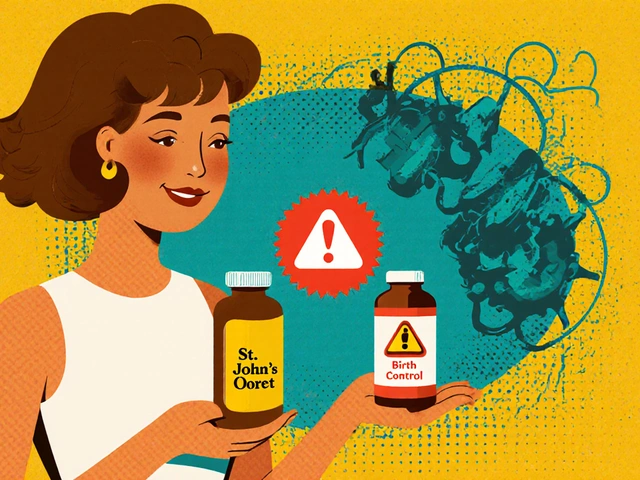

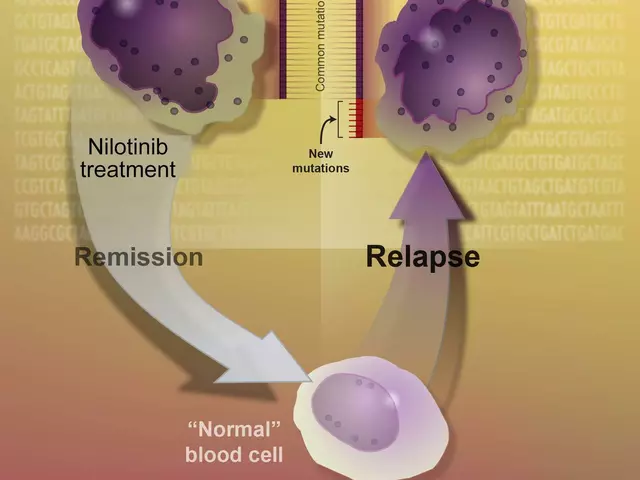
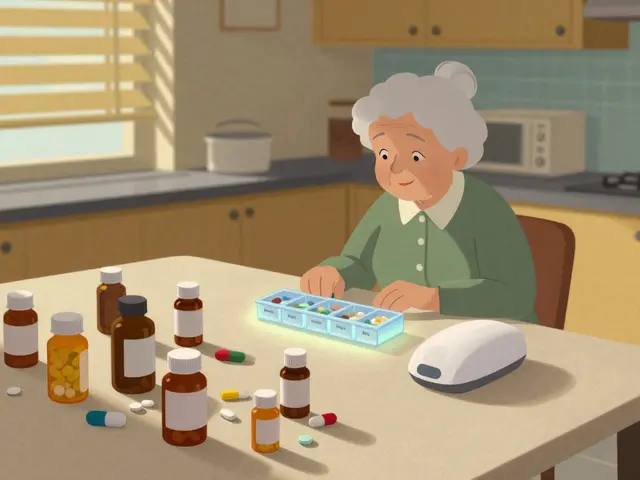
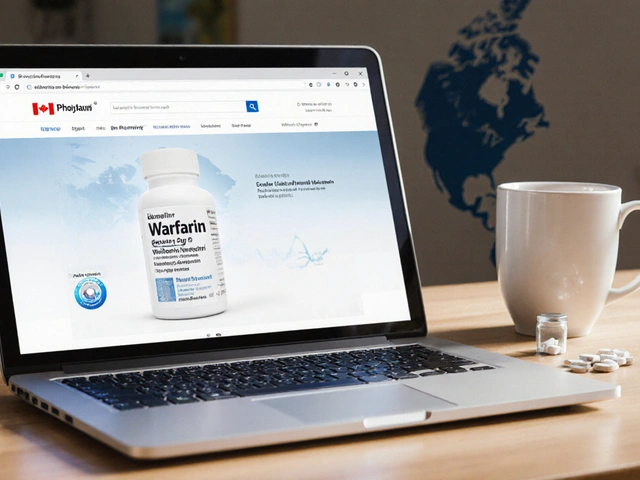
Sushmita S
14 February 2025 - 19:32 PM
I just scroll past all this spiritual stuff. 🤷♀️ I need chemo, not candles.
AnneMarie Carroll
15 February 2025 - 03:12 AM
This is the same fluffy nonsense they push in every cancer blog. Spirituality doesn't shrink tumors. Evidence-based medicine does. Stop romanticizing suffering.
John K
15 February 2025 - 15:02 PM
USA has the best cancer care in the world. Why are people wasting time on meditation? Just get treatment. We pay for it. You should too. 🇺🇸💪
Laura Anderson
17 February 2025 - 13:03 PM
The conflation of spirituality with therapeutic efficacy is statistically unsupported. While anecdotal reports of psychological comfort exist, they do not constitute clinical intervention. The placebo effect is real, but it's not a substitute for oncology. You're not 'healing' by chanting-you're delaying evidence-based care.
Avis Gilmer-McAlexander
17 February 2025 - 20:18 PM
I love how this post doesn't pretend spirituality is magic, but just... a soft place to land when everything else is screaming. I started painting during chemo. Didn't cure me, but it kept me from screaming into the void. Sometimes that's enough. 🌈
Jerry Erot
17 February 2025 - 21:10 PM
I've read every study on this. The NIH data is weak. Most spiritual coping research is self-reported and confounded by socioeconomic factors. Don't mistake correlation for causation.
Fay naf
18 February 2025 - 05:46 AM
The entire framework here is a neoliberal coping mechanism designed to absolve systemic healthcare failures. You're told to 'find your inner peace' while insurance denies your next scan. Spiritual bypassing at its finest
ANTHONY SANCHEZ RAMOS
18 February 2025 - 10:01 AM
bro i started doing 5 min breathwork before chemo and it literally changed my whole vibe 😌 i still cry sometimes but now i feel like i'm not alone in the fight. yall try it? it's free lol
Matt Czyzewski
20 February 2025 - 04:59 AM
The existential vacuum induced by oncological diagnosis necessitates a reorientation toward transcendent meaning-making. Heideggerian authenticity emerges not through pharmaceuticals, but through the phenomenological embrace of mortality. One does not 'cure' suffering; one transfigures it.
John Schmidt
21 February 2025 - 19:57 PM
They always say 'find your peace'... but what if your peace is just being angry? What if you don't want to meditate? What if you just want to scream at the sky? Why is that not valid too? 😔
Lucinda Harrowell
22 February 2025 - 22:17 PM
I sit with the trees sometimes. They don't ask me to be brave. Just to be. That's enough.
Joe Rahme
24 February 2025 - 14:04 PM
I lost my sister to NHL last year. She didn't meditate. She watched bad reality TV and ate ice cream straight from the tub. And she was the most present, loving person I ever knew. Spirituality isn't a checklist.
Leia not 'your worship'
25 February 2025 - 13:43 PM
I'm not religious but I started calling my grandma every day during treatment. She'd just hum and say 'you're gonna be okay, baby.' That was my prayer. And it worked.
Jo Sta
27 February 2025 - 08:00 AM
This is why America is falling apart. People think yoga fixes cancer. Go get a real doctor. Not a crystal healer.
KALPESH GANVIR
28 February 2025 - 15:46 PM
I'm from India. We don't have fancy treatments sometimes. But we have chai, family around the bed, and songs from old movies playing all day. It's not spiritual. It's just... human. And it holds you.
April Barrow
2 March 2025 - 11:59 AM
I'm not saying this is wrong. I'm just saying I don't need it. My treatment plan is my spirituality.
Melody Jiang
3 March 2025 - 14:39 PM
There's no one right way to carry this weight. Some people need silence. Others need noise. Some need scripture. Others need memes. The only wrong way is to tell someone their way isn't enough.
alex terzarede
4 March 2025 - 00:21 AM
I've been in remission for 7 years. What helped most wasn't meditation or prayer. It was knowing I had people who showed up with soup, didn't ask how I was feeling, and just sat with me. That's the real community.